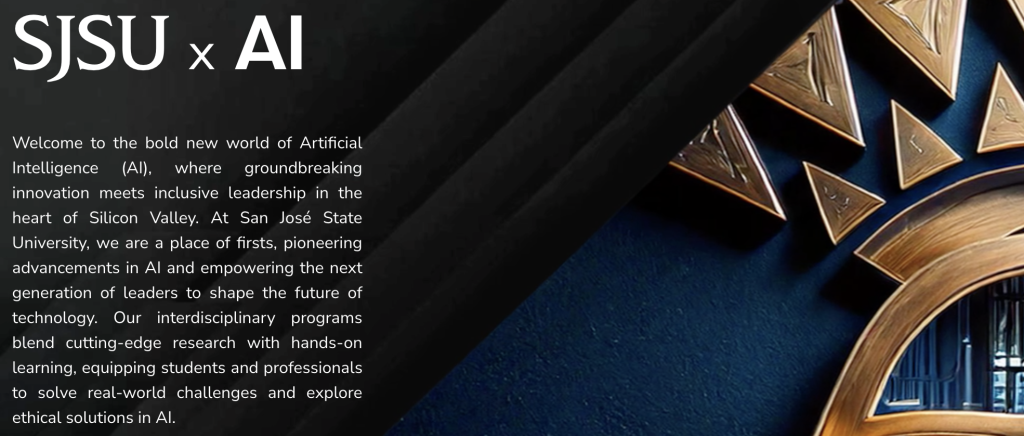It would be challenging to discuss the future of libraries, education, and the social and economic functions of society without discussing artificial intelligence––particularly, generative AI. Many of us (this includes me) avoided it, denied it, and attempted to reject it as a “tectonic shift” in technology within our lifetimes (Russell, 2024). Now it appears it is here to stay. Reflecting on the mounting excitement for AI and its potential to revolutionize learning, I still hesitate to embrace it wholeheartedly.
Maybe due to the fact that my academic background is in English, and that I never had a heightened interest in computers until recent years, but I had not heard serious discussions about AI and machine learning until I began working at a school in 2022. We had a professional development session led by the tech department on AI, ala ChatGPT. From what I recall, this conversation was basically that it can be challenging, but not impossible, to figure out when a student uses ChatGPT to write an assignment––considered different than using it to assist with early stage planning and brainstorming––and that certain uses of it can save teachers and administrators time on cumbersome generalized tasks. With this in mind, I was impressed to see AI appear on the New Media Consortium Horizon Report 2017 Library Edition’s “Important Developments in Technology for Academic and Research Libraries” timeline in the 4 to 5 year adoption range. Right on cue, it has become a major focus and investment of nearly every future-oriented institution I can think of.

Generative AI is a particularly glittery prospect for research purposes. With dominating models like ChatGPT Edu and Google Gemini for Education, alongside emerging tools like scite.ai, schools and libraries are being solicited to buy into these technologies for the sake of user skill-building and employability, deeper learning, and evidently, for these companies to make money. And these tools are getting better at all of these things rapidly. Back in 2023, Allison Papini took a look at where ChatGPT’s abilities could intersect with information literacy in alignment with the ACRL Framework. She found ChatGPT to lack authority, to be great for brainstorming and finding “keywords on a topic” (which can also be done by Google). She also points to the fact that there is free access to the tool because users’ data “is helping it continue to learn (…) [we] are contributing to ChatGPTs development by providing free labor.” Now with priced subscription models, ChatGPT and similar tools can make money and keep scraping data. We must pause and assess this as librarians with guiding principles and ethics: these companies are making massive gains, and we are getting…information delivered a little faster, and sometimes a little less accurate?
There has to be some value for institutions willing to integrate AI, and there are current uses that are very, very helpful. AI assisted metadata enrichment for catalog records means more searchable collections and AI research assistance can speak multiple languages and work with various literacy levels. The EDUCAUSE Horizon Report Teaching & Learning Edition for 2025 describes the trend of more “democratized” and “efficient” technology via AI as one that will empower students, stretch limited budgets, and offer equitable access opportunities to underserved communities. It can be a free tutor, a resume and career coach, and a translator, all in one.
But is this really the whole picture? AI assistive tools are improving, and getting more expensive to where only the institutions with the most money will be able to fund subscriptions without cutting money to other areas and employment positions. Students of various backgrounds might all have the ability to ask ChatGPT a question, but while some schools are teaching students how to craft effective prompts, others have students with no connected device at home. Lastly, the equity of AI feels like a particularly slippery slope when it comes to the environmental impact.
The environmental detriment of generative AI deserves a scope larger than this final paragraph, however, as libraries consider their service responsibilities to their communities, we cannot forget that of environmental stewardship. The computation power required from model training, the amount of water used to cool hardware in data centers and the electricity used resulting in increased carbon dioxide emissions is astounding (Zewe, 2025). These data centers that are used to “train and run the deep learning models behind popular tools like ChatGPT and DALL-E” are cropping up faster, and have serious environmental consequences on their neighboring communities.

I can’t lie, I have used these very tools and find them to work wonderfully when I need help finding the perfect word for what I am trying to say, brainstorming ideas for reading programs at work, or editing an email to my landlord. My partner learned how to code an entire website of his own using ChatGPT. There are ways these tools can be extremely effective for helping their users pursue lifelong learning. What remains, is a question of how we approach them with ethical, environmental, and civic awareness. And that might be a hard prompt to generate.
References
EDUCAUSE Horizon Report: Teaching and learning edition. (2025). EDUCAUSE. https://library.educause.edu/-/media/files/library/2025/5/2025hrteachinglearning.pdf
NMC Horizon Report: Library edition. (2017). The New Media Consortium. https://library.educause.edu/~/media/files/library/2017/12/2017nmchorizonreportlibraryEN.pdf
Papini, A. (2023, January 27). ChatGPT: A library perspective. Bryant University. https://library.bryant.edu/chatgpt-library-perspective
Russell, A. (2024, October 8). AI: A tectonic shift in human society. UC Davis. https://www.ucdavis.edu/news/ai-tectonic-shift-human-society
Zewe, A. (2025, January 17). Explained: Generative AI’s environmental impact. MIT News. https://news.mit.edu/2025/explained-generative-ai-environmental-impact-0117

Hi Jane,
After reading the articles about AI, my first immediate thought was about the environmental impact of it. Like you, I can see how generative AI has and can help people with a multitude of things. But I can’t help but think about the negative effects to the environments and communities that live near data centers. Great post!
@janem so glad you covered this topic and brought your own insights and personal experience to the mix. I agree with you about the Environmental impact and I’m always on the look out for newer articles that address that specific issue. I do like what you pulled out of the readings in your own research related to ethical uses within an education and for one’s own learning.